5 Causes of Wheel Bearing Noise (and What it Sounds Like)
Wheel bearings enable the wheels to rotate with minimal friction, but when a vehicle comes to a stop, the bearings start to cool off and then a vacuum is generated from the lubricant, air, and contacting metal.
The seals should hold the vacuum in place. If not, the sealed hub or the bearing will start pulling in air from the outside, which may include water and other contaminants. This can result in bearing damage and noise.
Here the most common causes of wheel bearing noise to help you track down the noisy bearing and prevent further damage and expense.
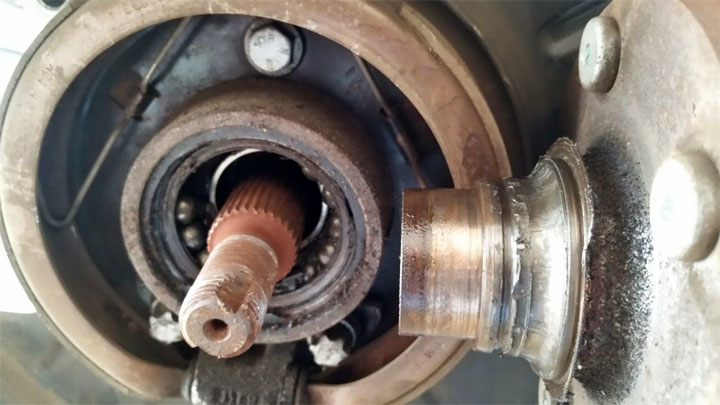
What Causes Noise From Wheel Bearings?
Wheel bearings are attached to the wheel and are constantly moving. Since the wheels are touching the road while driving, there could be a variety of reasons why the wheel bearing is making these strange noises or becoming damaged. Here are the top 5 reasons for noisy wheel bearings.
#1 – Improper Installation
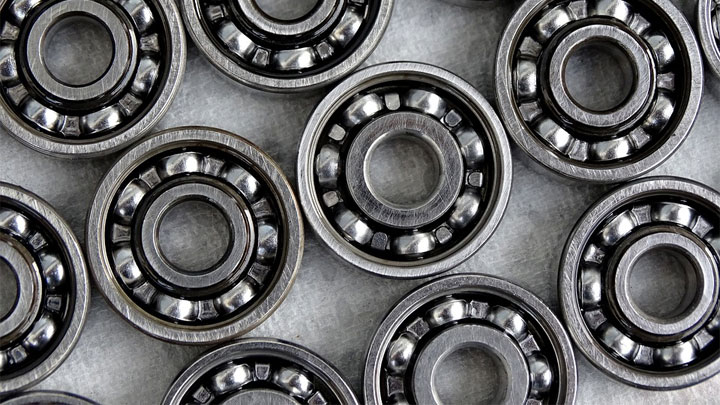
If your wheel bearings were replaced fairly recently, then it would be very strange if they were failing any time after that. The only conclusion is that the wheel bearings were somehow damaged because they were installed improperly or against the manufacturer’s recommendation.
#2 – Driving Through Deep Water
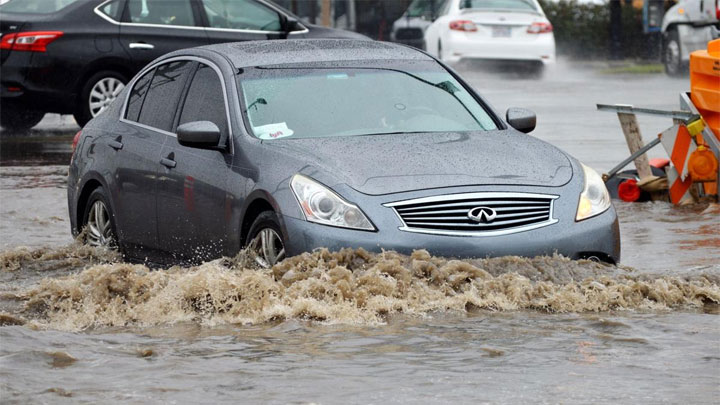
Wheel bearing seals are designed by engineers in a way so the pressure can leave the wheel bearings. They are installed at the factory with a petroleum based lubricant. The only bad thing is that this lubricant cannot stop water from getting through.
This means if you were to drive your car on a street that is flooded with water, then your bearings would be subjected to moisture. Once that happens, it mixes with the lubricant and makes it ineffective, causing the bearings to endure excess friction and ultimately be damaged.
You would not be able to service or repair a modern style wheel bearing either. The only solution from water damage is to replace the wheel bearing completely.
#3 – Driving On The Rough Roads
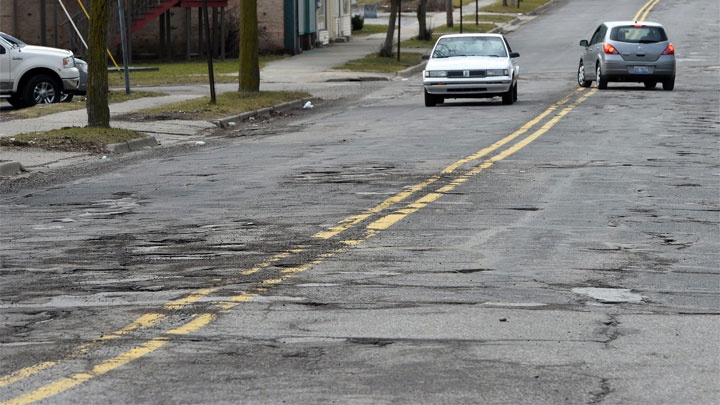
Wheel bearings receive the entire pressure of the weight of the vehicle. If you were to drive over a bumpy curb or pothole, the wheel bearing could be subjected to damage quite easily.
When you hit something, the bearing’s balls will likely get forced into the race, the grooved ring where the bearing sits. The result will be small imperfections in the bearings.
As you continue to drive the car with these imperfect bearings, it will cause more heat and friction. Soon the heat will cause tiny pieces to fall off which will pollute the lubricant of the wheel bearing and make it fail much quicker.
However, it is possible the failure could take a few months before it is noticeable.
#4 – Unbalanced Tires or Bad Shocks
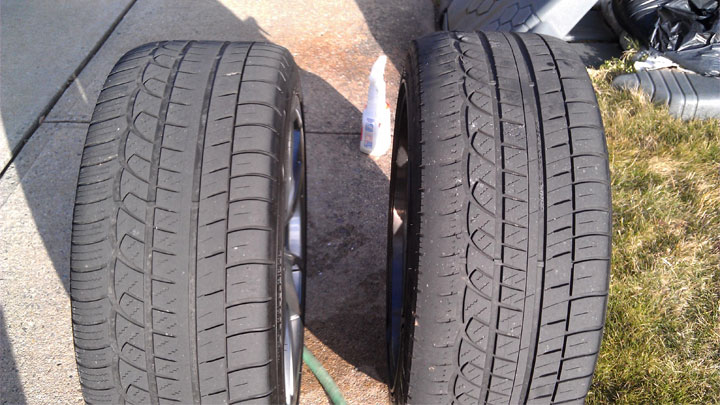
The wheel system depends on its wheel bearing, tire, lower arm, lower joint, knuckle arm, and shock. When your tires are unbalanced, some of those other parts could be damaged and then it will make noise come from the wheel bearing.
#5 – Accident On or Near the Wheel Area
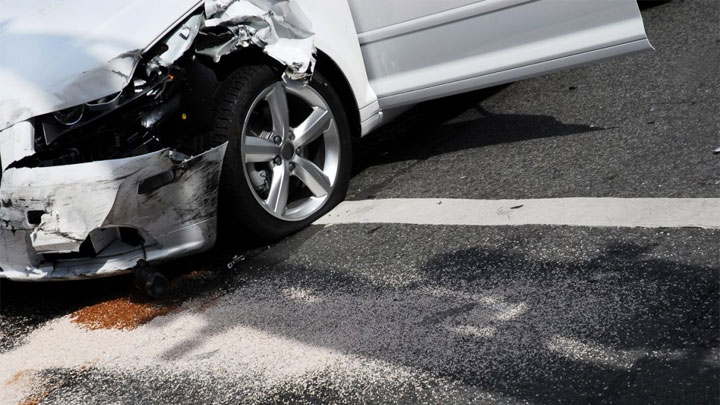
Wheel bearings are constantly in motion and they are connected to all the other parts mentioned in the last point. So, if the wheel area were to be subject to an accident, then the wheel bearing would likely also be damaged and then cause noise to form.
What Does a Bad Wheel Bearing Sound Like?
With a damaged or broken wheel bearing, it may sound like you’re driving over a rumble strip on the shoulder of a highway. It won’t be very loud at first but gets more noticeable as the condition of the bearing gets worse.
Wheel bearing noise can also sometimes be described as riding a bicycle as a kid that had a playing card attached to the wheel which hit the spokes as the wheel rotated.
While driving at 30 to 40 MPH on an empty road, turn your steering slight left then right, almost like you’re safely weaving in your lane.
Wheel bearing noise (especially in the front) will be amplified when you you make that turn since physics allow more weight of the car to be transferred to one side of the car. This can also help when it comes to diagnosing which wheel is causing the noise and has the bad wheel bearing.
Here’s a video that indicates wheel bearing noise. You may need to turn up your volume to hear.
How to Diagnose Damaged or Noisy Wheel Bearings
Take a jack and use it to lift the vehicle up until the tire is off the ground. Now try moving the tire in a vertical direction, and then a horizontal one. If the wheel wobbles or has some free play, then there might be damage to the bearing.
We made this video to demonstrate how to perform this inspection of the wheel bearing. Just remember the noise you hear from the wheel bearing tends to vary. The noise you hear depends on how badly the wheel bearing is damaged.
Speed may also contribute to the noise from the wheel bearing. Sometimes you may be driving at 60 MPH and hear the noise, but then accelerate to 65 MPH and the noise goes away.
This may happen only if there is a small amount of damage to the bearing. Therefore, you may not be able to notice this right away.
You will only be able to tell by feeling for any excess play like mentioned above. If you do notice the wheel moving around as you push and pull on it, take your car to a repair shop or tire shop and have it looked at by a professional.
They can confirm if there is damage to the wheel bearing or if another part is damaged like the wheel rim or the tire.
- Replace the Engine or Replace the Car? (11 Factors to Consider) - Apr 11, 2024
- Plastic Piece Dragging Under Your Car? (What It Is and What To Do) - Mar 21, 2024
- Timing Belt vs Timing Chain (What’s the Difference?) - Feb 27, 2024

I have a 2005 Cadillac STS AWD. I have recently developed a loud “humming” noise while driving. The noise goes away when turning left. I instantly thought passenger, front wheel bearing. I noticed a minimal amount of play in the tire once lifted, so I changed the hub assembly out. The problem persisted, so I changed the driver’s side hub assembly also. The noise remains. It doesn’t make sense to me that it could be a rear bearing as the noise goes away only when turning left, but I am at a loss for what to check next. Ideas?
I wonder if it could be an issue with the axle on that side? Did you happen to inspect the CV boots for tears while you were down there?
If it goes away when you turning left then, the problem is the left wheel bearing
ever figure it out ?
driving my 2000 ford expedition driving while raining hard. A sound came from under my car like i ran over something. then my driver side seemed like it wanted to come off but pulled over and bolts are strong. while driving sounded like grinding stronger around lower speed limits. pulled into my house next morning the tire didnt want to go reverse like it was struck but going forward no problem. bearings or worst not sure need to figure it out.
That’s not good. I would check the wheel bearing, but even before that: pull the wheel off if you’re able to and see if something is caught in the wheel or brake caliper.
Exactly,most of the time if I were to get pulled over dodging potholes , police would make me walk the line…… the holes are that bad and so many that make you look like drunk drunk driver
But if u changed both bearings and still hear the noise would that be the tires my upper control arm bushings are shot as well no more gasket just metal on metal clanking and get a wobble going 65 or more and car pulls to the left when stopping
I have recently changed front wheel bearing(left and right both) but still hearing sound of grinding after driving 2 to 3 km while pressing race Padel. What is the problem?
Check your wheels for clearance to make sure they aren’t rubbing on anything. If you can take a wheel off, that would be ideal. While you’re in there, check your brake calipers to make sure they can spin freely without any grinding. You may be able to find the source of the noise pretty quickly just by spinning the hub with the wheel off.
I suspect a wheel bearing on the front drivers side of my wife’s 2005 Trailblazer, but no rumbling sound only a rotational scraping noise when the car starts rolling….the sound is akin to the rotor dust shield rubbing against something.
If you have a place where you feel comfortable jacking up the vehicle, you might try taking a wheel off and rotating the hub to see if you can tell if it’s coming from the brakes or the wheel bearing itself.
If you’re having a hard time determining where the sound is coming from, you can remove the brake caliper and rotor to see if the sound persists.
Rumble strip is a great analogy! I like that, it’s very helpful.
about 1 month ago I had a BAD WHEEL BEARING and it looks like it has come back.I’ll have to take it back and having them to RE-CHECK them
Such a shame we cannot tie wheel bearing damage to a particular pothole incident… penny pinching highways departments find it cheaper to pay out on the few successful pothole damage claimants than to spend their budget repairing the potholes like they are tasked to… and have a duty of care to do.
I want an “I’m not drunk! I AM TRYING TO AVOID TORY POLICY POTHOLE DAMAGE” stickers for front and back of my car!